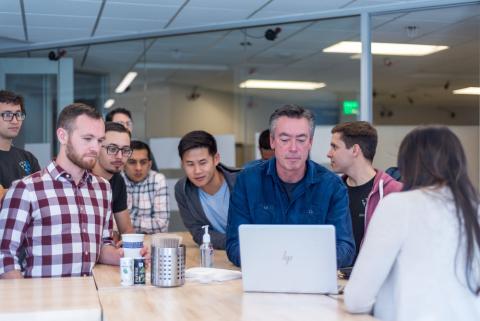You served 33 years in the US Navy. I know you had a number of paths you could have pursued after retiring. What was it about Shield AI that motivated you to join?
Shield AI embodies big thinking, big goals, and a big mission which is imminently attainable. I saw Shield AI as an opportunity to truly change the world for the better in a technology sector which is evolving at an incredible pace.
I grew up in a culture of tightly knit teams that were able to create outsized impacts based not on size, but on an exceptional level of commitment and excellence in planning and execution. I feel very fortunate to have found this same culture in Shield AI.
What is the most important lesson you have learned over your career?
Everything is about people. Mission first. People always. Take care of your people and they will take care of you.
What experiences inform your work at Shield AI?
Again it is all about people. All of my most memorable experiences center on people; people working together to solve complex problems and to overcome perceived limitations and obstacles. People demonstrating the power of the human spirit and teamwork to achieve nearly inconceivable and unlikely success. “What the mind can conceive, the body will achieve.”
It’s important to build the team with the right people – people with integrity, discipline, fire and a desire to create and to be part of something bigger than themselves or any single individual.
With respect to leadership, what are the fundamental skills all leaders should master?
Perhaps one of the most critical skills today is the ability to lead without leading, which is to say leaders should provide vision, inspiration, a big why and the resources and support for their teammates to succeed, without imposing demands.
I cannot recall ever running across a self starting, high achiever that thought they needed to be led. That said, every one of us appreciates being picked up by leadership and teammates when we have fallen and the mark has been missed. The extreme commitment required to achieve extreme results cannot effectively be imposed — it must be inspired by leadership and ultimately springs from within the individual and the team. They make the commitment collectively.
Ironically, being a good follower is foundational to being a good leader. The good follower not only commits to the goal but actively contributes in positive ways to improve not only the processes to attain the goal but also the goal itself. In the end, good leadership manifests as more than an organization that is well led — good leadership produces more good leaders.
How did you build these skills over your career?
Whatever skills I may have in this regard, I attribute fully to great leaders that I have had the fortune to serve with. It wasn’t always pretty, but it was pure.
Do you have any advice for people looking to improve upon these skills?
Honing one’s skill in any endeavor is a journey, not a destination. Never stop actively learning and growing. Be part of creating an environment for teammates to do the same.
Whose example informed your leadership style the most?
Admiral Bill McRaven is the gold standard for all I admire in leadership. I served under his leadership for many years across decades — he is a unique combination of unconditional support, compassion, self sacrifice and ruthless effectiveness in getting the job done. He is probably the only leader today that can tell Americans to “make their bed” in a way that is virally embraced.
How about teamwork? Is there any proven formula that teams can employ to ensure they are working together as seamlessly as possible?
It has been said, “There is no I in team.”
A team needs for every member to be a team builder and a team player. The strength of diversity in experience and perspectives is synergized when all voices can be heard, and equities are shared across the team. Leadership reinforces these dynamics organizationally in how they choose to reward teams, teams of teams, or individuals.
